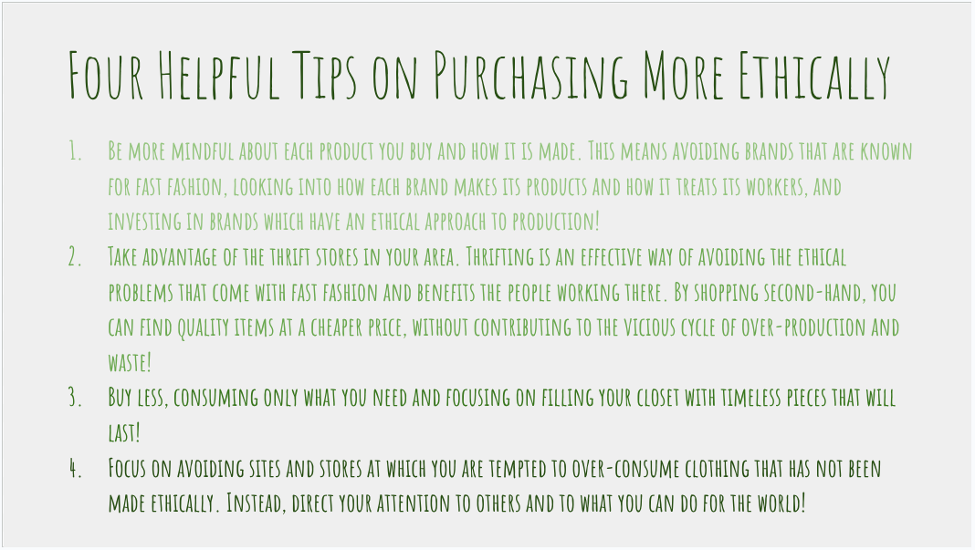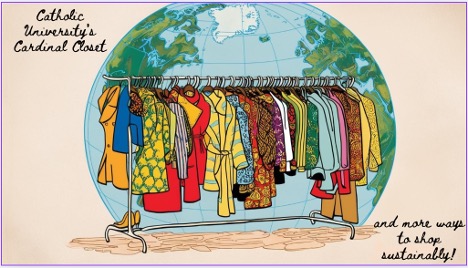Overconsumption as an Ethical Problem
Most agree that overconsumption in general is a problem, but do we really act on the slew of ethical issues related to it? What do we do to correct it? What do we do to pay attention to how it affects our earth and other people? Overconsumption has been on the rise as newer platforms like social media and algorithm advertising have become more common.[1] While we hear things like “only get what you need” and “it’s important to save,” our world overflows with brands grabbing our attention and making us feel like we need the newest product. While this has been a problem for generations, it has increased in the 20th and 21st centuries due to the gap between what people could buy previously on a lower salary and what they can buy now. The poor could not afford to over-consume during many centuries, and it was only the rich who had the privilege of accessing the newest things at any time. Many are now able to consume what they want when they want it. With the continuous stream of cheaply-made clothing, shoes, and goods through the influence of social media and ads, more people can and do buy more things than in the past.
Planned Obsolescence and the Changes in the Fashion Industry
A big contributor to today's consumerist lifestyle was the implementation of planned obsolescence, which limited the lifespan of many everyday goods. This redirected the goal of companies from making goods that would last to making goods that would work well for a few years, only to start malfunctioning. This gave consumers no easy choice but to pay more for the next product. Notable examples of this were: 1) The Phoebus cartel group, which significantly decreased the lifespan of lightbulbs from around 1925-1939 and caused people to purchase more than they used to; and 2) The Batterygate Scandal involving Apple. The company was caught slowing down older phones and tablets, pushing consumers to upgrade to their newest products and get rid of the old ones every few years. This kind of thing has trickled into the mainstream culture with fashion. The idea of planned obsolescence applies to fashion industry, leading us to the problem of fast fashion and excessive consumption.
Overconsumption Blurring the Lines of Morality
The pressure to be on trend is constantly surrounding us, blurring the lines of our morality. As we confuse reality with social media, we can be convinced that everyone is consuming new things all the time. We use links that lead us to cheap, fashionable, and quickly delivered clothing and don’t stop to think of the effects our purchases have on the world. An example of this is the Rana Plaza disaster in 2013, where an unsafely-built eight-story commercial building filled with garment factories collapsed, killing over a thousand workers and injuring even more. This is not the only case of people being killed and injured due to the unsafe environments and disastrous decisions of the fast fashion industry.
As ethical members of society, we must draw a line to put the safety of our fellow human beings over our wants as consumers. Intentional restraint needs to be implemented in our everyday purchases in order to protect humankind, looking out for not only ourselves, but others as well. In Pope Francis’ encyclical Laudato Sí, he talks of the blurred line of morality and consumption when we become self-centered in our wants, saying, “When people become self-centered and self-enclosed, their greed increases. The emptier a person’s heart is, the more he or she needs things to buy, own, and consume. It becomes almost impossible to accept the limits imposed by reality. In this horizon, a genuine sense of the common good disappears.”[2] This is why it is important to keep those in the Rana Plaza disaster and others like them in mind when we make purchases. To keep others in mind when we consume, and to alter our actions with thoughtfulness and sacrifice in mind, is to consume ethically.

Cardinal Closet
Cardinal Closet is a pop-up thrift store located on Catholic University’s campus. It offers a unique shopping experience that is both completely free and open with the convenience of the students, faculty and staff in mind. This initiative is a great opportunity to find stylish second-hand clothing while supporting sustainable fashion efforts. By visiting the Cardinal Closet, you are actively participating in the fight against the ethical travesty of fast fashion. The store takes donations, which ensures a constant stream of new and exciting pieces to find. Ethical, convenient, and free, Cardinal Closet is the perfect way to build a wardrobe that aligns with your values!
[1] Hagerborn, C., Ivarsson, I., & Linde, S. (2024). Trending towards overconsumption : The role of social media in shaping Swedish Gen Z’s buying patterns (Dissertation).
[2] Laudato Sí, 204

